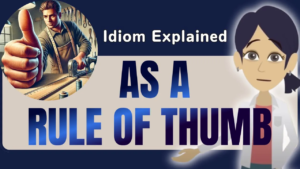Have you ever come across the phrase “knuckle down” and found yourself wondering if it involved some sort of hand exercise? It’s a common experience for anyone learning English as an additional language. This expression might sound like you need to press your knuckles on a table, yet it actually means to get serious about a task and devote focused, determined effort to it. Understanding idioms like this is vital for anyone aiming to improve their communication skills and gain deeper insight into English-speaking cultures. In what follows, we’ll explore everything you need to know about “knuckle down”—from its origins and meaning to practical examples and humorous misunderstandings. By the end, you’ll have a clear grasp of how to use this phrase confidently in everyday conversations.
Why Idioms Matter for Language Learners
Idioms can often appear to be a secret code. They don’t always align with the literal meaning of their words, making them puzzling for learners. Yet, these expressions are sprinkled throughout daily speech, informal writing, and social interactions. Here’s why learning idioms is crucial:
- Enhances Communication Skills
Being comfortable with idioms can help you sound more natural and fluent. You’ll understand people better in casual settings and appear more confident in professional ones. - Provides Cultural Insight
Many idioms reflect historical or cultural contexts. By studying them, you gain a window into the traditions and viewpoints of English-speaking cultures. - Boosts Confidence
Mastering idioms allows you to grasp the nuances of conversations, joke naturally with friends, and keep pace in group discussions. This sense of belonging can significantly boost your motivation and self-assurance.
Understanding “Knuckle Down”
Definition and Literal vs. Figurative Meaning
At first glance, you might think “knuckle down” means pressing your knuckles against a table or the floor. The literal image is clear—placing your knuckles down in a physical sense. But in everyday communication, “knuckle down” means to focus and work diligently on a task.
- Literal Image: Placing one’s knuckles on a surface, as if preparing for an activity.
- True Meaning: Committing yourself entirely to hard work and serious effort.
- Common Usage: Encouraging someone to stop procrastinating or slacking off, and to start dedicating real energy to whatever needs to be accomplished.
Origin of the Idiom
Many sources agree that the expression likely comes from the game of marbles. In marbles, players traditionally place their knuckles on the ground to shoot a marble precisely. Over time, that physical gesture turned into a metaphor for hunkering down and focusing. Although some references attribute it primarily to the nineteenth century, the earliest usage might date back to the mid-eighteenth century.
(Note: Some etymological records suggest the phrase could have appeared earlier than the nineteenth century, though there’s no single universally agreed-upon date. The link to marbles, however, remains the widely accepted origin.)
Humorous Misunderstandings
Idioms often create mix-ups, especially if someone interprets them literally. For instance:
- A new employee might be told to “knuckle down” on a project and start pressing their knuckles on the desk, thinking it’s some group activity.
- A friend could hear the phrase and hand over protective gloves, under the impression you’re about to do intense manual labor.
- Others might think you’re planning to fight or box, because knuckles are associated with fists.
Though these misunderstandings can be amusing, they underscore how important it is to grasp an idiom’s figurative meaning.
Visualizing the Phrase
A useful way to remember an idiom is to form a vivid mental picture. In this case, imagine someone literally positioning their knuckles on the ground, as if preparing to push forward. This visualization underscores the determination and energy needed to do any challenging task well.
- Enhances Memory
Linking an image to an idiom can create a mental hook that makes recall faster and more reliable. - Improves Comprehension
Turning an abstract phrase into a concrete scene helps you grasp it instantly, avoiding confusion. - Engages Your Learning
When you learn through images, you tend to find the process more enjoyable—no more boring drills or rote memorization.
Real-Life Application: A Success Story
Picture a student who consistently struggled with math assignments and had only a few days before an important exam. Her teacher urged her to “knuckle down,” meaning put aside distractions, avoid procrastination, and study with unwavering focus. She took the advice literally in its figurative sense—she cut out social media, formed a strict study routine, and prioritized her tasks. In the end, she not only passed her exam but earned a top score.
Key Lessons from This Story
- Focused Effort: Cutting off distractions often yields impressive results.
- Hard Work: You don’t need superpowers, just consistent, concentrated labor.
- Time Management: Prioritizing effectively can reduce stress and last-minute cramming.
This example shows how dedicating real energy to a single objective can lead to success, especially under tight deadlines. It’s not just about random hard work, but organized and deliberate focus.
Practical Uses in Everyday English
Sample Sentences
Below are some straightforward ways to use “knuckle down” in daily life:
- “I have a big report due next week, so I really need to knuckle down tonight.”
- You emphasize the need for concentration to meet a deadline.
- “Let’s knuckle down and finish organizing the garage before it gets dark.”
- Here, the person wants to complete a physical task, but the focus is on working methodically.
- “If you want to master the guitar, you’ve got to knuckle down and practice consistently.”
- Reiterates the point that real effort is key to mastering a new skill.
Rephrasing for Better Clarity
If the term “knuckle down” seems confusing, you might say:
- “I need to concentrate and work really hard.”
- “I have to get serious and complete this task.”
- “I’m going to stay focused until I’m done.”
In all these rephrasings, you’re conveying the same central idea: dedicating your mind and effort to productive work.
Similar and Opposite Expressions
Similar Expressions
- Buckle down
Means nearly the same thing and is often used interchangeably. - Get down to business
Implies you’re shifting from small talk or procrastination to serious, goal-oriented work. - Put your nose to the grindstone
Suggests long-term diligence and persistence. - Get serious
Less idiomatic but has the same connotation of dropping distractions and focusing.
Opposite Expressions
- Slack off
Describes reducing effort or failing to maintain your usual level of work. - Procrastinate
Involves delaying tasks, often until it’s almost too late. - Take it easy
Suggests relaxing and not pushing yourself.
Related Idioms
- Roll up one’s sleeves: Conveys getting prepared for hard work.
- Put one’s shoulder to the wheel: Urges people to exert serious effort.
- Dig in one’s heels: Often implies stubbornness, but it can also mean showing firm resolve in a challenging situation.
These expressions help you expand your vocabulary to handle various scenarios, from tackling professional duties to managing your own personal projects.
A Quick Quiz to Test Your Knowledge
What does “knuckle down” mean?
- A. To put your knuckles on a surface literally
- B. To focus intensely and work hard
- C. To take a complete break from work
Answer: If you chose B, you’re correct! When someone says “knuckle down,” they want you to concentrate, remove distractions, and seriously apply yourself to the task at hand.
Practical Advice on Staying Motivated
Knowing idioms isn’t just about expanding vocabulary. It’s also about adopting the right mindset. Whether you’re trying to complete a project at work or aiming to pick up a new hobby, telling yourself to “knuckle down” can be a quick motivational trick. Here are some easy steps:
- Set Clear Goals
Having a specific target can keep you focused. - Plan Your Time
Break down tasks into manageable segments and set mini-deadlines. - Limit Distractions
Switch off your phone notifications, close unnecessary tabs on your computer, and create a space conducive to concentration. - Reward Yourself
After achieving a milestone, give yourself a small treat or break.
When you consistently incorporate these methods, you’ll find it easier to knuckle down and produce the results you want.
Note on Factual Accuracy
Some learners see the phrase “knuckle down” and assume it has purely modern origins. In fact, it’s likely much older, possibly dating to the mid-eighteenth century. The connection to marbles, where you physically place your knuckles on the ground before shooting, remains a widely accepted explanation. Keep in mind that idiom origins often involve a blend of historical sources and evolving usage.
Key Takeaways
- Meaning: “Knuckle down” is a call to get serious, ditch distractions, and focus on completing a task or objective.
- Origins: Historically tied to the game of marbles, where players placed their knuckles on the ground.
- Real-Life Impact: Embracing this idiom as a mindset can help in both professional settings and personal goals.
- Similar and Opposite Idioms: Deepen your language skills with related phrases like “buckle down,” “roll up one’s sleeves,” or the opposite, “slack off.”
Conclusion
Incorporating idioms into your daily vocabulary can transform the way you interact in English, helping you come across as more natural and culturally aware. “Knuckle down” in particular is a valuable reminder to avoid drifting and push yourself wholeheartedly. It highlights the power of earnest, focused effort—whether you’re dealing with urgent work deadlines, personal goals, or even just tidying the house. By keeping this idiom in mind, you’ll be better equipped to handle responsibilities with efficiency and determination. So the next time you feel the urge to take it easy, remember the marbles connection, picture those knuckles on the ground, and knuckle down until you achieve what you set out to do.









Comment